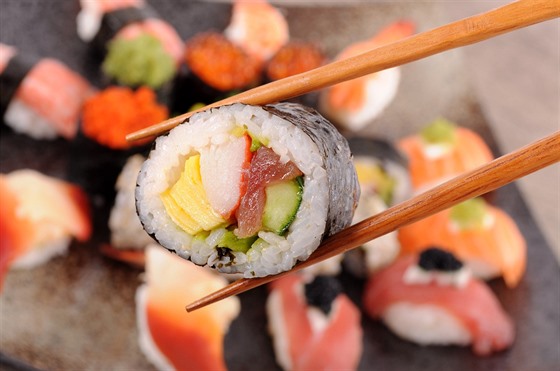From the streets of Japan to the plates of consumers worldwide, sushi is a versatile food that serves as both a snack or a high-class meal. It is available in many forms from the recognizable seaweed wrapped rolls of rice and filling to delicious individual cuts of fish known as sashimi. Many view sushi as an occasional treat choosing only to partake occasionally, but is eating too much a bad thing? Before answering this question, it is best to understand a little bit more about this delicious dish and its health benefits.
Types of Sushi
The most recognizable is maki. Maki is a roll of fish, vegetables or other ingredients and rice wrapped with traditional roasted seaweed. Nigiri, another consumer favorite, is easily spotted by the fresh cuts of raw fish served over rice. Sashimi is like nigiri but consists of only the raw fish without rice. Temaki is a cone-shaped wrap similar in appearance to maki but allows for an easier grip. More complicated varieties such as the California Roll use a combination of ingredients like avocado and spicy mayonnaise. While these are a few of the most common types, chefs are only limited by their imaginations when creating new dishes.
Is Sushi Healthy?
Sushi is generally regarded as a healthy food. It is low in fat and a source of good carbohydrates. Specialty ingredients like seaweed are rich in iodine and other essential nutrients. Compared to other sources of protein, fish is lean and typically healthier. Common accompaniments such as ginger and wasabi are a rich source of vitamins, minerals and dietary antioxidants. As long as calorie rich ingredients like mayonnaise are used sparingly, sushi is an excellent choice for the health-conscious diner.
Benefits of Regular Consumption
Aside from being delicious, regular consumption of sushi correlates with good health. Omega-3 fatty acid protects the heart and is concentrated in many types of commonly served fish. Omega-3 helps regulate cholesterol levels in the body preventing clogged arteries, heart attacks and stroke. The lean proteins and balanced carbohydrate levels boost metabolism and provide many of the nutrients necessary to maintain a strong, healthy and lean body. Compared to many other foods, sushi is rich in cancer fighting antioxidants and minerals.
Is Too Much Sushi a Bad Thing?
Too much sushi is not a bad thing. It can serve as a quick snack, meal on the go or fun dining out experience. It is a source of lean proteins, heart protecting Omega-3 fatty acids and cancer fighting antioxidants and nutrients. The only caution is consuming too much mercury containing fish. The Food and Drug Administration does caution against eating large amounts of mercury containing fish such as tuna. However, there is good news. Sushi is such a diverse dish, it is possible to eat a lot of it while still meeting guidelines on mercury consumption. Opting for vegetables or fish lower in mercury such as eel, crab and salmon is an easy way to mix up a sushi heavy diet and stay healthy.
Christopher is a food lover and always seeking new healthy ways to live stronger and better both physically and mentally. Sushi has become a delicious weapon in his current fight for a healthier mind and body.



